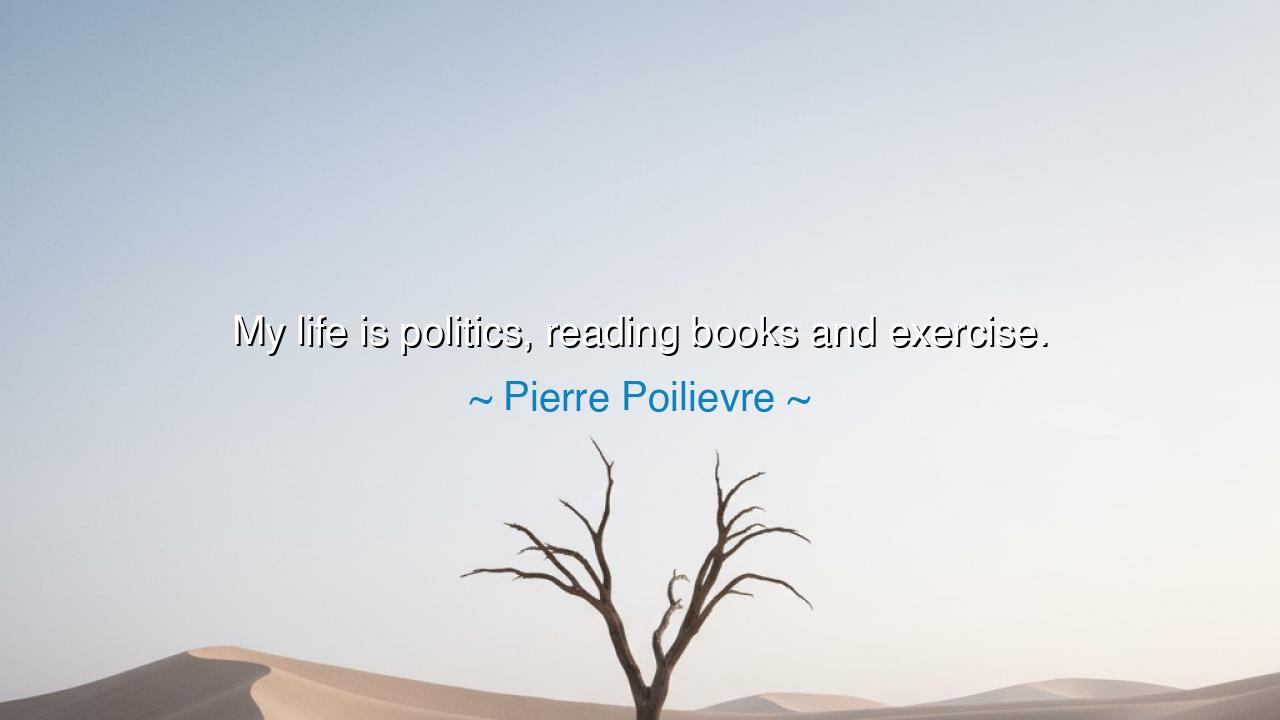
My life is politics, reading books and exercise.






The words of Pierre Poilievre, “My life is politics, reading books and exercise,” reveal the threefold pillars upon which he builds his existence: the struggle of politics, the nourishment of the mind, and the strengthening of the body. In these words is echoed an ancient truth—that to live fully and with purpose, a man must cultivate not one aspect of himself, but all. For without balance, power becomes blind, knowledge becomes sterile, and strength becomes aimless.
The ancients themselves taught this harmony. The Greeks exalted the political life, where men sought justice and order in the polis. They revered the reading of books, through which philosophy and poetry refined the soul. And they praised exercise, for they believed that a sound body was the companion of a sound mind. To weave these together was to embody arete, excellence in the fullest sense—a life shaped by discipline and purpose.
History bears witness in shining examples. Consider Marcus Aurelius, the philosopher-emperor of Rome. His life was consumed by politics, commanding armies and guiding an empire. Yet he fortified his spirit through reading, writing his Meditations as a dialogue with truth. And he endured hardship through exercise of the body, living not as a soft ruler, but as a soldier among soldiers. His greatness lay not in one pursuit, but in the balance of all three, as Poilievre’s words reflect.
The wisdom in this quote also teaches that each element sustains the others. Politics is the storm; it demands wisdom and endurance. Books provide the compass in that storm, offering lessons from those who have walked before. Exercise steels the vessel that carries both heart and mind, so that neither is broken under strain. Together they form a trinity of strength, ensuring that a life lived in the public eye does not collapse under its own weight.
Let this teaching endure: to live with purpose is to cultivate all dimensions of the self. The leader who engages only in politics risks corruption. The thinker who seeks only books risks irrelevance. The athlete who devotes himself only to exercise risks vanity. But the one who binds these three together—action, wisdom, and strength—builds a life of harmony, power, and endurance. For such a life is not scattered, but whole, and capable of carrying the burdens of destiny.






T136. Nguyen Thi Nhu Thuong 11b5
From a constituent’s perspective, I’m listening for translation into outcomes. Fitness can model discipline and stamina; reading can widen empathy. But how does that show up in accessible policies? For example, would your office publish a ‘learners’ list’—three books that shifted your stance this year—and pair it with one concrete proposal each inspired? On exercise, could you advocate community options—safe sidewalks, park lighting, affordable rec passes—so well-being isn’t a privilege? I’m looking for links between personal habits and public benefit, not just biography.
AAPham An An
I want to understand the daily rhythm behind this formula. Politics demands constant reaction, while books and exercise reward deliberate pacing. How do you protect deep work from the permanent campaign? Do you timebox reading, use device bans, or rely on early-morning training to clear mental noise? I’m interested in your calendar architecture: fixed thinking blocks, office hours, and a weekly review that translates insights into agenda items. What metrics convince you the mix is healthy—sleep quality, injury-free streaks, or fewer avoidable snap judgments?
CMChau Minh
Part of me admires the focus; part of me worries about a life tuned to one frequency. When vocation saturates identity, the risk is confirmation bias dressed up as dedication. Would you commit to a regular curiosity sabbath—say, one day a week for non-political pursuits and random reading outside your priors? I’d also love to know your strategy for avoiding echo chambers: who on your team is tasked with steelmanning opponents, and when do you publicly document a genuine change of mind?
HVHuyen Vy
As a reader, I’m curious how these three pillars actually shape judgment. Politics can devour attention; reading and training could be your guardrails. Would you publish a living reading log—with brief notes on how each book affected a current position—and a short reflection after workouts about what ideas crystallized? I’m asking for mechanics, not slogans: how do you connect page to policy and reps to restraint? If we saw the pipeline from inputs to decisions, it might build trust beyond partisan branding.